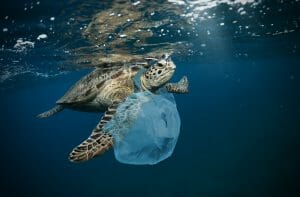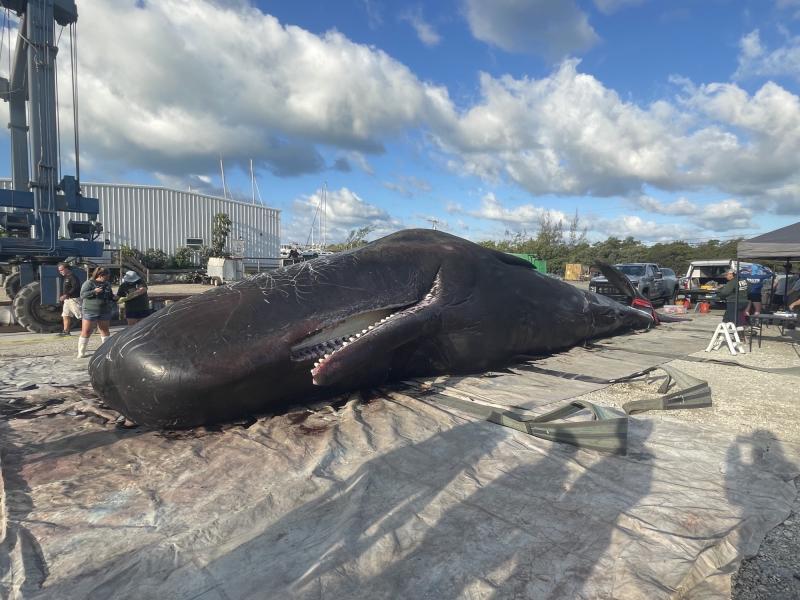An endangered sperm whale beached and died off the Florida Keys had a full stomach of human-created plastic pollution, which likely led to his death, according to a necropsy report.
The 47-foot male landed in Mud Key, about 15 miles northeast of Key West, in May. Biologists who conducted the animal’s autopsy reported a mass of line, net pieces, and plastic inside the gentle giant’s system.
They added that the whale was “extremely thin” and that the trash likely interfered with the whale’s ability to digest food and absorb nutrition.
“This debris likely did not allow the whale to eat properly, leading to its emaciated condition and stranding,” a spokesperson for the Florida Fish and Wildlife Conservation Commission told local news.
A fisherman first spotted the whale and called authorities.
“It’s just so sad to see a creature like that floating dead on the water,” said Capt. Jack Carlson, the owner of Two Conchs Charter.
When NOAA’s Marine Mammal Stranding Network arrived, the whale had already died.
The tragic death is the second in a week. Monitors observed a female sperm whale calf swimming alone who ended up dying stranded in a shallow tidal flat, according to NOAA. The cause of her death is still unknown, pending a necropsy.
Debris Free Oceans, a nonprofit dedicated to reducing global plastic pollution, reports that every year an estimated 8 million metric tons of plastic trash – whose weight would equal that of 80 million blue whales, or one billion elephants, as a comparison — enter the ocean.
“Unfortunately, when animals consume our trash, they can’t break it down in their stomachs,” Maddie Kaufman, program and outreach director of Debris Free Oceans, told local news. “They fill up and actually think they’re full, so they can end up starving.”
It’s also not only whales impacted: The Oceanic Society reports that turtles, seabirds, fish, and even coral reefs are victims of people’s plastic pollution.

Image via Adobe Stock
Scientists estimate that more than half of the world’s sea turtles and nearly every seabird on earth has eaten plastic, according to the Oceanic Society.
Oceana, another leading organization stewarding the world’s oceans, said they have seen marine animals choking, getting strangled, and also entangled by plastic trash.
Carlson said Florida Keys guides do their part by removing plastic trash when they see it while out on expeditions and encouraged other people to do the same.
“If you guys are out there on the water and you see a piece of floating trash, whether it’s a balloon, a floating bottle, debris, just pick it up,” he said. “We do it every day down here.”
TAKE ACTION
Some other action steps you can take immediately to help whales and other marine mammals, from the Oceanic Society:
- Eliminate Your Use of Single-Use Plastics. Bypass plastic bags, plastic grocery produce bags, plastic straws, bottled water, and takeout containers and utensils and opt instead of fabric bags, re-usable metal straws or water bottles, and bring your own containers and coffee cups when you go out to eat or work.
- Recycle Properly. Make sure you know what types of plastics can be recycled locally, and make sure to thoroughly clean your recyclables as contamination will cause workers to toss the entire batch.
- Participate in a Beach or River Cleanup. If you live near water, join a local group stewarding your area’s natural resources. Or, if you’re planning a beach vacation, check in advance to see if there are any cleanups happening for the time you’ll be at your destination.
- Avoid products with microbeads. These substances can go straight from your face scrubs, toothpastes, and body washes into bodies of water. Look for ‘polyethylene’ or ‘polypropylene’ in your products’ labels, or use this handy product look-up to see if your planned purchases contain microbeads.
- Get Educated. Have a movie night and check out documentaries about the plastic problem, with recommendations including Plastic Ocean, Garbage Island, Bag It, Addicted to Plastic, and Plasticized.

